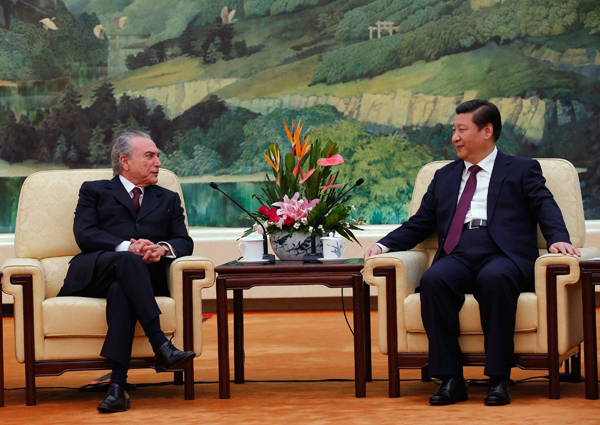

 |
|
Brazil's Vice-President Michel Temer talks with China's President Xi Jinping during their meeting at the Great Hall of the People in Beijing, November 7, 2013. [Photo/Agencies] |
President calls for closer cooperation among world's emerging markets
President Xi Jinping called for unity and cooperation among emerging markets on Thursday while meeting with visiting Brazilian Vice-President Michel Temer in Beijing.
Xi said China is willing to work with Brazil to maintain close exchanges between the two countries' leaders, to strengthen communication and coordination in international affairs, and to expand and enhance the two countries' pragmatic cooperation in safeguarding the common interests of developing countries.
Within the year, Xi has met his Brazilian counterpart, Dilma Rousseff, twice. Xi said the two leaders have made plans for the development of the two countries' relations, and reached many important consensuses.
Temer began his official visit to China on Monday and will leave on Sunday. On Wednesday, he co-chaired the third session of the China-Brazil High-level Coordination and Cooperation Committee. The meeting, also co-chaired by Vice-Premier Wang Yang, was held in Guangzhou, capital of Guangdong province.
Xi expressed China's support for Brazil's hosting of the next full BRICS summit in 2014, and wished the Latin American country success when it hosts the FIFA World Cup next year.
China and Brazil established their strategic partnership in 1993, and boosted the relationship to a comprehensive strategic partnership in 2012.
Next year, the two countries will witness the 40th anniversary of the establishment of diplomatic relations.
Temer said Brazil is happy about the good development of the two countries' strategic partnership, and hopes China achieves further success in its development.
"Brazil also wants to enhance the high-level exchanges with China, and to have the China-Brazil High-level Coordination and Cooperation Committee play a role in promoting bilateral cooperation in various fields," he said.
The Brazilian vice-president said the two countries can strengthen communication and cooperation within the framework of BRICS, make joint efforts in global governance and work on developing relations between China and Latin America.
Wu Hongying, director of the Institute of the Latin American Studies at the China Institutes of Contemporary International Relations, said the relationship between China and Brazil has clear strategic and global significance.
"The two countries' cooperation is highly complementary. China is the largest economy in Asia, and Brazil is the largest economy in Latin America. Both countries have huge markets," Wu said.
China surpassed the United States as Brazil's largest trading partner and largest export destination country in 2009.
China's General Administration of Customs said bilateral trade was $85.7 billion in 2012, up 1.8 percent from the previous year.
Wu said Brazil is one of the most resource-rich countries in the world, with high-level industrialization and urbanization, but needs to attract foreign investment to help build and improve its poor infrastructure and upgrade its industrial structure.
Meanwhile, China is at a crucial stage of industrialization, when it needs to import a lot of natural resources and energy. Chinese companies also face the challenge of working in the international market, she added.
China and Brazil also cooperate under many multilateral mechanisms, such as BRICS, G20, the United Nations and the World Trade Organization. The two countries communicate and coordinate in many global challenges, including climate change, food security and economic issues.
"Sino-Brazilian cooperation not only fully reflects the strategic consensuses reached by the two countries, but also safeguards the interest of developing countries, and promotes interregional cooperation between Asia and Latin America," Wu said.